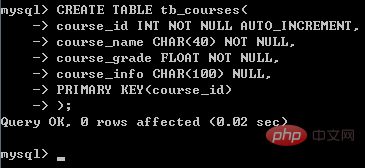What is the command used to add new data to the database?
The command used to add a new data in the database is "insert". The INSERT command can insert one or more rows of tuple data into an existing table in the database. It has two syntax forms: 1. With the VALUES keyword, the syntax is "INSERT INTO table name (column name 1,...column name n) VALUES (value 1..., value n);"; 2. With the SET keyword, the syntax is "INSERT INTO table name SET column name 1 = value 1, column name 2 = value 2,...;".

The operating environment of this tutorial: windows7 system, mysql8 version, Dell G3 computer.
The command used to add a new data in the database is insert.
insert command to insert data
After the database and table are successfully created, data needs to be inserted into the database table. You can use the INSERT statement to insert one row or multiple rows of tuple data into an existing table in the database.
The INSERT statement has two syntax forms, namely the INSERT…VALUES statement and the INSERT…SET statement.
1, INSERT...VALUES statement
The syntax format is:
INSERT INTO 表名 (列名1,…列名n) VALUES(值1…,值n);
-
First, after the INSERT INTO clause, specify the table name and a comma-separated list of columns in parentheses.
Then, place the comma-separated values of the corresponding columns in parentheses after the VALUES keyword.
#Before executing the insert statement, you need to have the INSERT permission to execute the INSERT statement.
2, INSERT...SET statement
The syntax format is:
INSERT INTO 表名 SET 列名1= 值1,列名2=值2,…;
This statement is used to directly Certain columns in the table specify corresponding column values, that is, the column name of the data to be inserted is specified in the SET clause, col_name is the specified column name, and the equal sign is followed by the specified data. For unspecified columns, the column The value is assigned the default value for the column.
It can be seen from the two forms of INSERT statement:
Use INSERT...VALUES statement to insert one row of data or multiple rows of data into the table;
Use the INSERT…SET statement to specify the value of each column in the inserted row, or to specify the values of some columns;
INSERT…SELECT statement Insert data from other tables into the table.
The INSERT…SET statement can be used to insert the values of some columns into the table, which is more flexible;
INSERT…VALUES statement Multiple pieces of data can be inserted at one time.
Insert command usage example:
1. Add values to all fields in the table
Create a course information table tb_courses in the test_db database, including course number course_id, course name course_name, course credits course_grade and course notes course_info
CREATE TABLE tb_courses( course_id INT NOT NULL AUTO_INCREMENT, course_name CHAR(40) NOT NULL, course_grade FLOAT NOT NULL, course_info CHAR(100) NULL, PRIMARY KEY(course_id) );

There are two ways to insert values into all fields in the table: one is to specify all field names; the other is to not specify field names at all.
[Example 1] Insert a new record in the tb_courses table, the course_id value is 1, the course_name value is "Network", the course_grade value is 3, and the info value is "Computer Network".
First check the tb_courses table
The query result shows that the current table content is empty and there is no data. Next, perform the operation of inserting data
INSERT INTO tb_courses(course_id,course_name,course_grade,course_info) VALUES(1,'Network',3,'Computer Network');
You can see that the record was inserted successfully. When inserting data, all fields of the tb_courses table are specified, so new values will be inserted for each field.
The order of the column names after the INSERT statement does not need to be the order when the tb_courses table is defined. That is, when inserting data, it is not necessary to insert in the order defined by the table, as long as the order of the values is the same as the order of the column fields.
2. Add values to specified fields in the table
Insert data into specified fields in the table. Insert values into only some fields in the INSERT statement, while leaving others The value of the field is the default value when the table is defined.
[Example 2] Insert a new record in the tb_courses table, the course_name value is "System", the course_grade value is 4, and the course_info value is "Operating System"
INSERT INTO tb_courses SET course_name = 'System', course_grade = 4, course_info = 'Operation System';
【相关推荐:mysql视频教程】
The above is the detailed content of What is the command used to add new data to the database?. For more information, please follow other related articles on the PHP Chinese website!

Hot AI Tools

Undresser.AI Undress
AI-powered app for creating realistic nude photos

AI Clothes Remover
Online AI tool for removing clothes from photos.

Undress AI Tool
Undress images for free

Clothoff.io
AI clothes remover

AI Hentai Generator
Generate AI Hentai for free.

Hot Article

Hot Tools

Notepad++7.3.1
Easy-to-use and free code editor

SublimeText3 Chinese version
Chinese version, very easy to use

Zend Studio 13.0.1
Powerful PHP integrated development environment

Dreamweaver CS6
Visual web development tools

SublimeText3 Mac version
God-level code editing software (SublimeText3)

Hot Topics
 How does Go language implement the addition, deletion, modification and query operations of the database?
Mar 27, 2024 pm 09:39 PM
How does Go language implement the addition, deletion, modification and query operations of the database?
Mar 27, 2024 pm 09:39 PM
Go language is an efficient, concise and easy-to-learn programming language. It is favored by developers because of its advantages in concurrent programming and network programming. In actual development, database operations are an indispensable part. This article will introduce how to use Go language to implement database addition, deletion, modification and query operations. In Go language, we usually use third-party libraries to operate databases, such as commonly used sql packages, gorm, etc. Here we take the sql package as an example to introduce how to implement the addition, deletion, modification and query operations of the database. Assume we are using a MySQL database.
 How does Hibernate implement polymorphic mapping?
Apr 17, 2024 pm 12:09 PM
How does Hibernate implement polymorphic mapping?
Apr 17, 2024 pm 12:09 PM
Hibernate polymorphic mapping can map inherited classes to the database and provides the following mapping types: joined-subclass: Create a separate table for the subclass, including all columns of the parent class. table-per-class: Create a separate table for subclasses, containing only subclass-specific columns. union-subclass: similar to joined-subclass, but the parent class table unions all subclass columns.
 iOS 18 adds a new 'Recovered' album function to retrieve lost or damaged photos
Jul 18, 2024 am 05:48 AM
iOS 18 adds a new 'Recovered' album function to retrieve lost or damaged photos
Jul 18, 2024 am 05:48 AM
Apple's latest releases of iOS18, iPadOS18 and macOS Sequoia systems have added an important feature to the Photos application, designed to help users easily recover photos and videos lost or damaged due to various reasons. The new feature introduces an album called "Recovered" in the Tools section of the Photos app that will automatically appear when a user has pictures or videos on their device that are not part of their photo library. The emergence of the "Recovered" album provides a solution for photos and videos lost due to database corruption, the camera application not saving to the photo library correctly, or a third-party application managing the photo library. Users only need a few simple steps
 Detailed tutorial on establishing a database connection using MySQLi in PHP
Jun 04, 2024 pm 01:42 PM
Detailed tutorial on establishing a database connection using MySQLi in PHP
Jun 04, 2024 pm 01:42 PM
How to use MySQLi to establish a database connection in PHP: Include MySQLi extension (require_once) Create connection function (functionconnect_to_db) Call connection function ($conn=connect_to_db()) Execute query ($result=$conn->query()) Close connection ( $conn->close())
 An in-depth analysis of how HTML reads the database
Apr 09, 2024 pm 12:36 PM
An in-depth analysis of how HTML reads the database
Apr 09, 2024 pm 12:36 PM
HTML cannot read the database directly, but it can be achieved through JavaScript and AJAX. The steps include establishing a database connection, sending a query, processing the response, and updating the page. This article provides a practical example of using JavaScript, AJAX and PHP to read data from a MySQL database, showing how to dynamically display query results in an HTML page. This example uses XMLHttpRequest to establish a database connection, send a query and process the response, thereby filling data into page elements and realizing the function of HTML reading the database.
 How to handle database connection errors in PHP
Jun 05, 2024 pm 02:16 PM
How to handle database connection errors in PHP
Jun 05, 2024 pm 02:16 PM
To handle database connection errors in PHP, you can use the following steps: Use mysqli_connect_errno() to obtain the error code. Use mysqli_connect_error() to get the error message. By capturing and logging these error messages, database connection issues can be easily identified and resolved, ensuring the smooth running of your application.
 Analysis of the basic principles of MySQL database management system
Mar 25, 2024 pm 12:42 PM
Analysis of the basic principles of MySQL database management system
Mar 25, 2024 pm 12:42 PM
Analysis of the basic principles of the MySQL database management system MySQL is a commonly used relational database management system that uses structured query language (SQL) for data storage and management. This article will introduce the basic principles of the MySQL database management system, including database creation, data table design, data addition, deletion, modification, and other operations, and provide specific code examples. 1. Database Creation In MySQL, you first need to create a database instance to store data. The following code can create a file named "my
 Tips and practices for handling Chinese garbled characters in databases with PHP
Mar 27, 2024 pm 05:21 PM
Tips and practices for handling Chinese garbled characters in databases with PHP
Mar 27, 2024 pm 05:21 PM
PHP is a back-end programming language widely used in website development. It has powerful database operation functions and is often used to interact with databases such as MySQL. However, due to the complexity of Chinese character encoding, problems often arise when dealing with Chinese garbled characters in the database. This article will introduce the skills and practices of PHP in handling Chinese garbled characters in databases, including common causes of garbled characters, solutions and specific code examples. Common reasons for garbled characters are incorrect database character set settings: the correct character set needs to be selected when creating the database, such as utf8 or u









